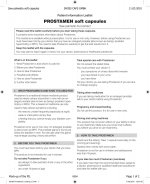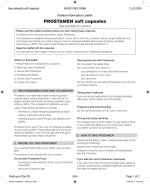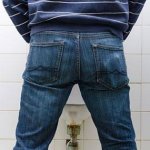Nearly every man over 45 has some degree of enlargement of the prostate gland, which slowly progresses throughout the aging process.
The prostate gland is the male organ that produces semen, the milky-colored fluid that nourishes and transports ***** during ejaculation. It sits beneath your bladder and surrounds your urethra — the tube that drains urine from your bladder. When it becomes enlarged, the prostate can put pressure on your urethra and cause difficulty urinating.
Most men have a period of prostate growth in their mid- to late 40s. At this time, cells in the central portion reproduce more rapidly, resulting in prostate gland enlargement. As tissues in the area enlarge, they often compress the urethra and partially block urine flow. Benign prostatic hyperplasia (BPH) is the medical term for prostate gland enlargement.
Treatment of prostate gland enlargement depends on your signs and symptoms and may include medications, surgery or non-surgical therapies. Prostate gland enlargement is not related to the development of prostate cancer.
Prostate gland enlargement varies in severity among men and doesn't always pose a problem. Only about half the men with prostate gland enlargement experience signs and symptoms that become noticeable or bothersome enough for them to seek medical treatment.
* Weak urine stream
* Difficulty starting urination no matter how strong the urge
* Dribbling at the end of urination
* Straining while urinating
* Frequent need to urinate
* Increased frequency of urination at night (nocturia)
* Urgent need to urinate
* Not being able to completely empty the bladder
* Blood in the urine (hematuria)
* Urinary tract infection
The exact cause of prostate enlargement is unknown. As with age, changes in the ratio of male hormone (testosterone) and female hormone (estrogen) levels in men stimulate the prostate to grow. Another theory is that with aging, the testosterone hormone is converted to dihydrotestosterone (DHT) which increases the size of the prostate. Theoritically, drugs that inhibit the conversion of testosterone to DHT or decreasing DHT could reduce the symptoms of BPH. While conventional drugs are available, these have high potential for serious side effects such as impotence and dizziness. Recently, these drugs have been associated with increase death rates in patients with hypertension and heart diseases.
Acute urinary retention (AUR).
AUR is a sudden painful inability to urinate. To empty the bladder, a catheter must be inserted into the bladder through the *****. Some men with BPH require surgery to treat AUR.
Urinary tract infections (UTIs).
Some men with BPH end up having surgery to remove part of the prostate to prevent frequent UTIs.
Bladder stones.
These are mineral deposits that can cause infection, bladder irritation, blood in the urine and obstruction of urine flow.
Bladder damage.
This occurs when, over a long period of time, the bladder hasn't emptied completely. The muscular wall of the bladder stretches, weakens and no longer contracts properly. Often, men with BPH-caused bladder damage improve after surgery to remove part of the prostate.
Kidney damage.
This is caused by frequent infections and acute urinary retention. BPH can also cause a condition called hydronephrosis, a swelling (dilation) of the urine-collecting structures in one or both kidneys due to pooled urine that can't drain out of the kidney.
The operation is called prostatectomy. It may be performed by surgery through an abdominal incision or by a method known as transurethral resection of the prostate (TURP). Either method requires anesthesia. In transurethral resection, no incision is made. Instead, a thin tube is passed up the ***** to the prostate. In the tip of the tube is an electric cutting loop that removes the enlarge tissue. The electric cutting loop is guided with the help of a miniature telescope that is also in the tube.
Regardless of the technique that is used, prostatectomies are successful. They relieve urinary difficulties, and the prostate problems seldom recur. Occasionally the man becomes impotent after operation. Almost all men who have had surgery become sterile because their semen is expelled backward into the bladder instead of being ejaculated, but they are still able to have orgasm. Semen in the bladder causes no harm. It is simply eliminated in the urine.
Making some lifestyle changes can often help control the symptoms of an enlarged prostate and prevent your condition from worsening. Consider these measures:
Limit beverages in the evening.
Don't drink anything for an hour or two before bedtime to help you avoid wake-up trips to the bathroom at night.
Limit caffeine or *******.
These can increase urine production, irritate your bladder and worsen your symptoms.
Limit diuretics.
If you take water ***** (diuretics), talk to your doctor. Maybe a lower dose, a milder diuretic or a change in the time you take your medication will help. Don't stop taking diuretics without first talking to your doctor.
Limit decongestants or antihistamines.
These drugs tighten the band of muscles around your urethra that control urine flow, which makes it harder to urinate.
Go when you feel the urge.
Try to urinate when you first feel the urge. Waiting too long to urinate may overstretch the bladder muscle and cause damage.
Schedule bathroom visits.
Try to urinate at regular times to "retrain" the bladder. This can be done every four to six hours during the day and can be especially useful if you have severe frequency and urgency.
Stay active.
Inactivity causes you to retain urine. Even a small amount of exercise can help reduce urinary problems caused by BPH.
Keep warm.
Colder temperatures can cause urine retention and increase your urgency to urinate.
Take some supplements.
Natural Supplements Helpful for BPH
Saw palmettoappears to be beneficial for relief of an enlarged prostate gland in many men. Studies shows the effectiveness of saw palmetto in stage 1 and stage 2 (early stages) of BPH. Stage 1 is characterized by increase frequency of urination during day and night, delayed onset of urination, and a weak stream. Stage 2 is characterized by the symptoms of stage 1 accompanied by failure to completely empty the bladder. Another research has shown that saw palmetto contains anti-allergic and anti-inflammatory activity. Saw palmetto also inhibits the conversion of testosterone to dihydrotestosterone in some studies.
L-Arginine
is converted to nitride oxide which aids the relaxation of blood vessels. The effect is better blood circulation in the body thus helps stimulate and maintain good penile erection. It is helpful in treating sterility in male and it also increases ***** count in men with a low count.
Zinc
is necessary for prostate health. It has been shown to reduce the size of prostate in majority of patients. Zinc is essential for cell division, repair and growth and healing of wounds and infections. Zinc is needed for male fertility and is also known as an aphrodisiac.
The above mentioned key ingredients for healthy prostate and men’s general well-being are now available in a capsule form called Prostamen. Recommended intake two capsules after dinner. Take it regularly as dietary supplement for prostate health.


The prostate gland is the male organ that produces semen, the milky-colored fluid that nourishes and transports ***** during ejaculation. It sits beneath your bladder and surrounds your urethra — the tube that drains urine from your bladder. When it becomes enlarged, the prostate can put pressure on your urethra and cause difficulty urinating.
Most men have a period of prostate growth in their mid- to late 40s. At this time, cells in the central portion reproduce more rapidly, resulting in prostate gland enlargement. As tissues in the area enlarge, they often compress the urethra and partially block urine flow. Benign prostatic hyperplasia (BPH) is the medical term for prostate gland enlargement.
Treatment of prostate gland enlargement depends on your signs and symptoms and may include medications, surgery or non-surgical therapies. Prostate gland enlargement is not related to the development of prostate cancer.
Prostate gland enlargement varies in severity among men and doesn't always pose a problem. Only about half the men with prostate gland enlargement experience signs and symptoms that become noticeable or bothersome enough for them to seek medical treatment.
Signs & Symptoms of BPH
* Weak urine stream
* Difficulty starting urination no matter how strong the urge
* Dribbling at the end of urination
* Straining while urinating
* Frequent need to urinate
* Increased frequency of urination at night (nocturia)
* Urgent need to urinate
* Not being able to completely empty the bladder
* Blood in the urine (hematuria)
* Urinary tract infection
Causes
At birth, the prostate gland is about the size of a pea. It grows slightly during childhood and then at puberty undergoes a rapid growth spurt. By age 25, your prostate is fully developed and is about the size of a walnut.The exact cause of prostate enlargement is unknown. As with age, changes in the ratio of male hormone (testosterone) and female hormone (estrogen) levels in men stimulate the prostate to grow. Another theory is that with aging, the testosterone hormone is converted to dihydrotestosterone (DHT) which increases the size of the prostate. Theoritically, drugs that inhibit the conversion of testosterone to DHT or decreasing DHT could reduce the symptoms of BPH. While conventional drugs are available, these have high potential for serious side effects such as impotence and dizziness. Recently, these drugs have been associated with increase death rates in patients with hypertension and heart diseases.
Diagnosis
The diagnosis is made by eliciting a classic history, by rectal examination that shows an enlarged gland, by finding a normal prostate specific antigen (PSA) and by confirmatory transrectal ultrasound.Complications
Prostate gland enlargement becomes a serious health threat only if it interferes with your ability to empty your bladder. A bladder that's continuously full can interfere with your sleep, cause recurrent bladder infection or result in kidney damage. Men who have an enlarged prostate are at increased risk of:Acute urinary retention (AUR).
AUR is a sudden painful inability to urinate. To empty the bladder, a catheter must be inserted into the bladder through the *****. Some men with BPH require surgery to treat AUR.
Urinary tract infections (UTIs).
Some men with BPH end up having surgery to remove part of the prostate to prevent frequent UTIs.
Bladder stones.
These are mineral deposits that can cause infection, bladder irritation, blood in the urine and obstruction of urine flow.
Bladder damage.
This occurs when, over a long period of time, the bladder hasn't emptied completely. The muscular wall of the bladder stretches, weakens and no longer contracts properly. Often, men with BPH-caused bladder damage improve after surgery to remove part of the prostate.
Kidney damage.
This is caused by frequent infections and acute urinary retention. BPH can also cause a condition called hydronephrosis, a swelling (dilation) of the urine-collecting structures in one or both kidneys due to pooled urine that can't drain out of the kidney.
Treatment
If your symptoms are mild and tests indicate that immediate surgery is not necessary, your physician may take no action. But if the problem does not improved, if it gets worse, or if tests show that urine flow is seriously blocked, the affected tissue must be removed.The operation is called prostatectomy. It may be performed by surgery through an abdominal incision or by a method known as transurethral resection of the prostate (TURP). Either method requires anesthesia. In transurethral resection, no incision is made. Instead, a thin tube is passed up the ***** to the prostate. In the tip of the tube is an electric cutting loop that removes the enlarge tissue. The electric cutting loop is guided with the help of a miniature telescope that is also in the tube.
Regardless of the technique that is used, prostatectomies are successful. They relieve urinary difficulties, and the prostate problems seldom recur. Occasionally the man becomes impotent after operation. Almost all men who have had surgery become sterile because their semen is expelled backward into the bladder instead of being ejaculated, but they are still able to have orgasm. Semen in the bladder causes no harm. It is simply eliminated in the urine.
Making some lifestyle changes can often help control the symptoms of an enlarged prostate and prevent your condition from worsening. Consider these measures:
Limit beverages in the evening.
Don't drink anything for an hour or two before bedtime to help you avoid wake-up trips to the bathroom at night.
Limit caffeine or *******.
These can increase urine production, irritate your bladder and worsen your symptoms.
Limit diuretics.
If you take water ***** (diuretics), talk to your doctor. Maybe a lower dose, a milder diuretic or a change in the time you take your medication will help. Don't stop taking diuretics without first talking to your doctor.
Limit decongestants or antihistamines.
These drugs tighten the band of muscles around your urethra that control urine flow, which makes it harder to urinate.
Go when you feel the urge.
Try to urinate when you first feel the urge. Waiting too long to urinate may overstretch the bladder muscle and cause damage.
Schedule bathroom visits.
Try to urinate at regular times to "retrain" the bladder. This can be done every four to six hours during the day and can be especially useful if you have severe frequency and urgency.
Stay active.
Inactivity causes you to retain urine. Even a small amount of exercise can help reduce urinary problems caused by BPH.
Keep warm.
Colder temperatures can cause urine retention and increase your urgency to urinate.
Take some supplements.
Natural Supplements Helpful for BPH
Saw palmetto
L-Arginine
is converted to nitride oxide which aids the relaxation of blood vessels. The effect is better blood circulation in the body thus helps stimulate and maintain good penile erection. It is helpful in treating sterility in male and it also increases ***** count in men with a low count.
Zinc
is necessary for prostate health. It has been shown to reduce the size of prostate in majority of patients. Zinc is essential for cell division, repair and growth and healing of wounds and infections. Zinc is needed for male fertility and is also known as an aphrodisiac.
The above mentioned key ingredients for healthy prostate and men’s general well-being are now available in a capsule form called Prostamen. Recommended intake two capsules after dinner. Take it regularly as dietary supplement for prostate health.


Attachments
-
You do not have permission to view the full content of this post. Log in or register now.
Last edited:
